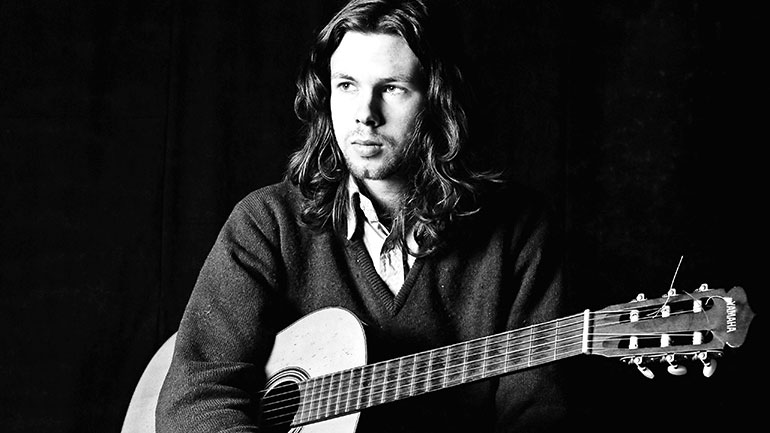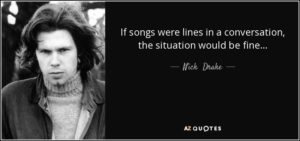
Nick Drake was born Nicholas (Nick) Rodney Drake (June 19, 1948 – November 25, 1974) and was an English singer-songwriter and musician, best known for his acoustic guitar-based songs.
His father, Rodney Shuttleworth Drake (1908–1988), moved to Rangoon, Burma, in the early 1930s to work as an engineer with the Bombay Burmah Trading Corporation. In 1934, he met the daughter of a senior member of the Indian Civil Service, Mary Lloyd (1916–1993), known to her family as “Molly”.
Both of Nick’s parents were musical and each wrote pieces of music. Recordings of some of his mother, Molly’s songs, which have come to light since her death, are very similar in tone, chords and outlook to the later work of Nick. Both mother and son shared a fragile vocal delivery; and people have said there was a parallel sense of foreboding and fatalism in their music.
Encouraged by his mother, Nick Drake learned to play piano at an early age and started to write and record songs on a reel-to-reel tape recorder she kept in the family drawing room.
Nick Drake played piano in the school orchestra, and also learned clarinet and saxophone. In 1964 he formed a band, The Perfumed Gardeners, with four schoolmates. Drake played piano and occasional alto sax and did vocals, the group performed R&B covers, jazz standards, and songs by The Yardbirds and Manfred Mann. Apparently, Chris de Burgh tried to join the band, but was rejected because his taste in music was seen as “too poppy” by the other members.
In 1966 Nick Drake won a scholarship to study English Literature at Fitzwilliam College, Cambridge, but he delayed starting to spend six months at the University of Aix-Marseille, France. While in France he began to practise guitar in earnest and, to earn money, he would busk with friends in the town centre. Drake also began to smoke cannabis during this time.
When he returned to England, Drake moved into his sister’s flat in Hampstead, London, before enrolling at Fitzwilliam College. His tutors found him to be a very bright student, but unwilling to apply himself.
Nick began performing in local clubs and coffee houses around London, and in February 1968, while at the Roundhouse in Camden Town, he made an impression on Ashley Hutchings, the bass player with Fairport Convention. Hutchings said he was impressed by Drake’s skill as a guitarist, but even more so by his image. He said “He looked like a star. He looked wonderful, he seemed to be 7ft tall.”
Hutchings introduced Drake to the American record producer Joe Boyd, who owned the production and management company Witchseason Productions. The company was, at the time, licensed to Island Records, and Boyd, who had discovered Fairport Convention and been responsible for introducing John Martyn and The Incredible String Band to a mainstream audience, was a highly respected figure on the UK folk scene. He and Nick Drake formed an immediate bond, and Boyd acted as a mentor to Drake throughout his career.
A four-track demo, recorded in Drake’s college room in early 1968, led Boyd to offer Nick a management, publishing, and production contract.
Drake then signed to Island Records when he was still only 20 years old, and still a student at Cambridge University, and released his debut album, Five Leaves Left, in 1969. By 1972, he had recorded two more albums entitled Bryter Layter and Pink Moon. Neither sold more than 5,000 copies on initial release.

His reluctance to perform live, or be interviewed, contributed to his lack of commercial success and Nick failed to find a wide audience during his lifetime. However, his work has posthumously achieved a much wider notice and great recognition.
No footage of Nick Drake as an adult has ever been released, only still photographs and home footage from his childhood.
Drake suffered from major depression, and this was often reflected in his lyrics. On completion of his third album, 1972’s Pink Moon, he withdrew from both live performance and recording, and retreated to his parents’ home.
On November 25, 1974, at the young age of 26, Nick Drake died from an overdose of amitriptyline pills, a prescribed antidepressant. The cause of death was determined to be suicide, although the verdict has been disputed by some of his friends and members of his family.
There was, however, a widely held view that, whether accidental or not, Drake had “given up on life” at this point.
Joe Boyd has said that he prefers to believe the overdose was accidental. He remembers that Nick’s parents had said his mood had been very positive, and that he had even planned to move back to London to restart his music career. In contrast, Gabrielle Drake, Nick’s eldest sister, has said she prefers to think her brother committed suicide, saying “I’d rather he died because he wanted to end it than it to be the result of a tragic mistake. That would seem to me to be terrible.”
By the mid-1980s Drake was being credited as an influence by such artists as Robert Smith (The Cure), David Sylvian (Japan), and Peter Buck (R.E.M.). In 1985, The Dream Academy reached the UK and US charts with “Life in a Northern Town”, a song written for and dedicated to Drake. By the early 1990s, Nick Drake had come to represent a certain type of “doomed romantic” musician in the UK music press.
In 2003 all three of Nick Drake’s albums appeared on Rolling Stone magazine’s list of The 500 Greatest Albums of All Time: Five Leaves Left was ranked number 280, Bryter Layter number 245, and Pink Moon number 320.
The gravestone where Drake’s ashes are buried, mingled with those of his parents, is inscribed with the epitaph ‘Now we rise / And we are everywhere’, which was taken from the lyrics of “From the Morning”, the final song on his final album, Pink Moon.
Check out Nick Drake on Amazon


Pingback: My Boy Lollipop singer Millie Small died May 5, 2020
Pingback: 11 Musicians Who Found Fame After Death - Dead Musicians